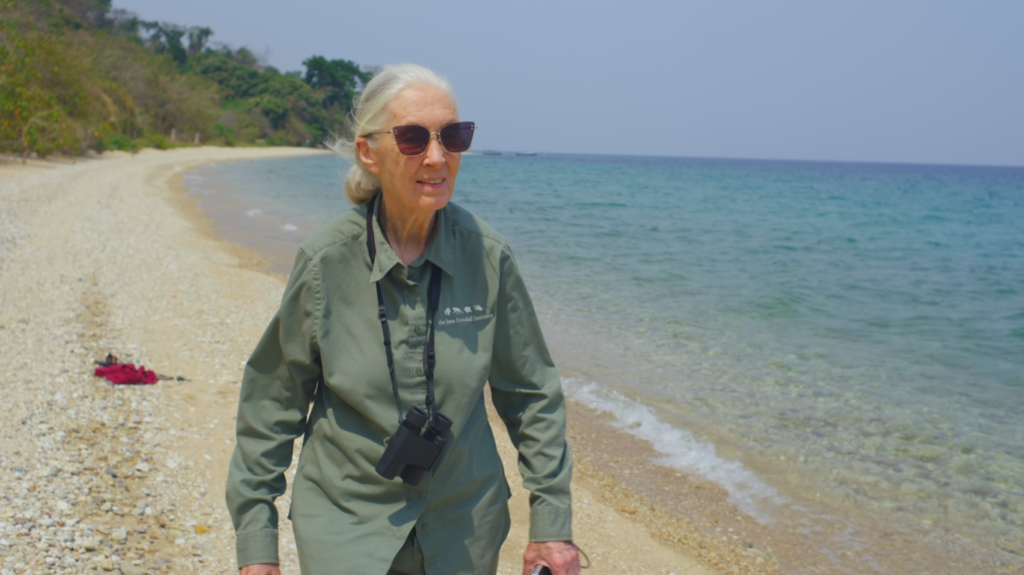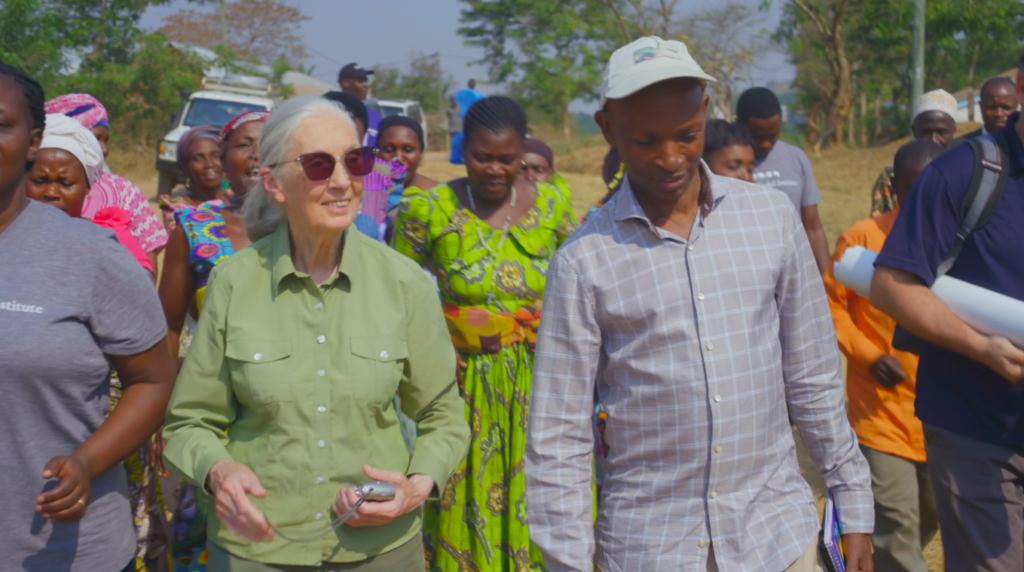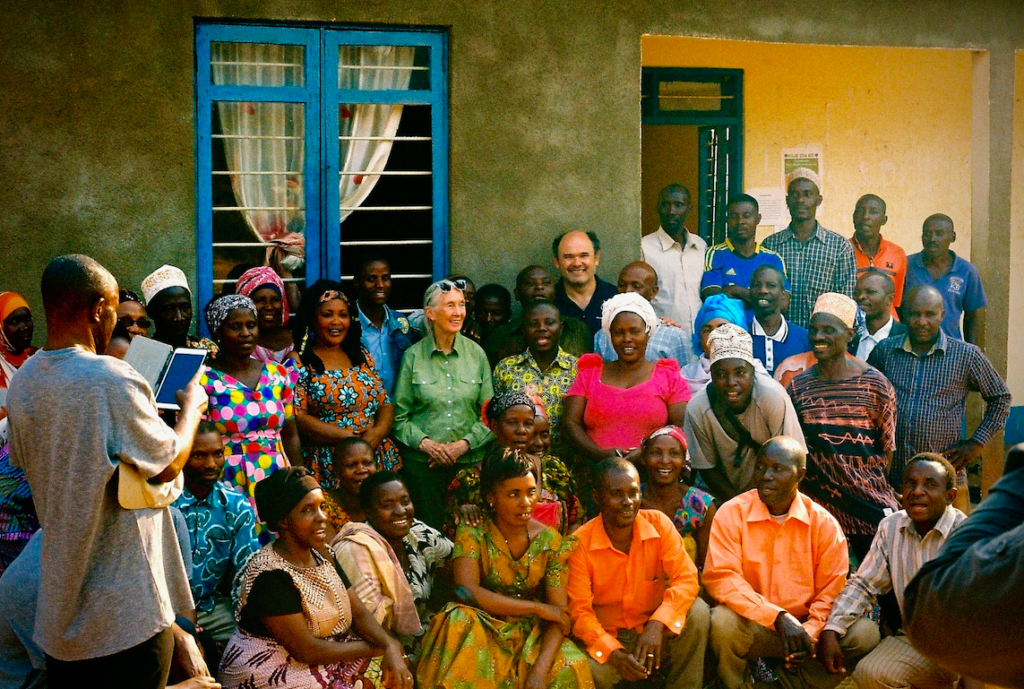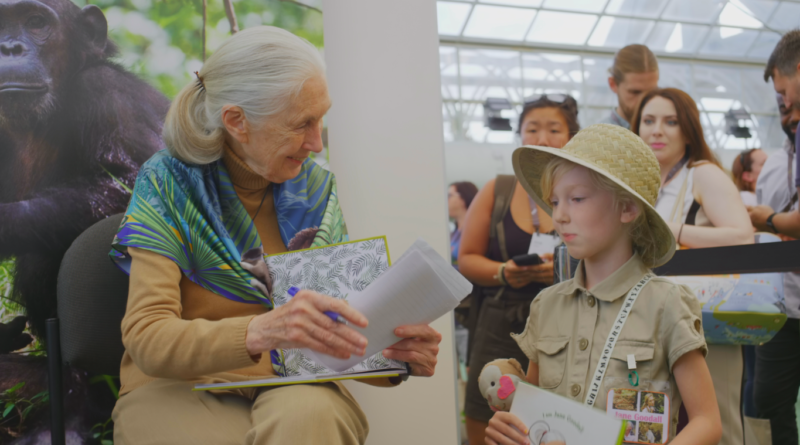INTERVIEW: Jane Goodall, living a life of hope
Photo: Dr. Jane Goodall signs a book at the Esri Conference in 2019. Goodall’s work is the subject of a new documentary called Jane Goodall: The Hope. Photo courtesy of National Geographic / Michael Haertlein / Provided by press site with permission.
With the coronavirus pandemic killings tens of thousands of people around the world and disrupting economies and workforces, one can easily fall victim to a hopelessness about the long-term prospects of planet Earth. Add into the equation the promise of difficult days ahead due to climate change, the continued mistreatment of animals, the pollution of the world’s oceans and the desperate poverty so many communities and individuals find themselves facing, and there may be no more room left for positivity and optimism. It would seem the silver lining has been blotted out like a full solar eclipse.
Then there’s Dr. Jane Goodall, the world-famous primatologist and conservationist who has dedicated her life to spreading awareness about animals, humans and the environment. She has been on the frontlines of Earth’s challenges for decades, and she seems as good a source as any to contextualize these difficult, trying times.
Luckily, Goodall is holding out hope, and that’s a powerful rallying cry that can be found amidst soul-crushing headlines and uncomfortable realities.
Goodall’s life and insights have been the subject of many movies and books — everything from Brett Morgen’s award-winning Jane documentary from a couple years ago to Seeds of Hope and Hope for Animals and Their World, two of the more recent books penned by the chimpanzee expert. Throughout these projects, and interwoven throughout her spoken narrative at speaking engagements throughout the world, is that one powerful idea: hope.
It’s no wonder that Goodall’s life has once again inspired a film crew. This time, the movie is called Jane Goodall: The Hope, and it will premiere on Earth Day, April 22 at 9 p.m. on Nat Geo and Nat Geo WILD, with streaming options on Disney+ and Hulu. The network promises a documentary that highlights “Dr. Goodall’s vast legacy of four decades, having transformed environmentalism, nonhuman animal welfare and conservation through her innovative approaches, and becoming a worldwide icon.”
For Goodall, who recently spoke to a group of journalists on the phone from her safe quarantine in England, hope is part of her enduring legacy. It’s not just a slogan, but a belief. Here’s how she uses that word to combat both climate change and the pandemic.

Finding a Light in the Darkness
“With climate change — and this is backed up by some of the climatologists that I’ve talked with, it’s not just … wishful thinking — there is a window of time, but it’s closing,” Goodall told Hollywood Soapbox. “It depends on us all getting together and taking action if we want to save the future of humanity from a planet which is virtually unlivable, although we may find ways to live on it, I suppose. So my hope there lies in the energy and commitment of the young people of our Roots & Shoots program that’s in 65 countries, all working on projects they choose, to make the world better for people, animals and the environment.”
In addition to the hugely successful Roots & Shoots program, which has transformed the lives of so many young people, Goodall focuses her hope on the power of the human intellect. She is impressed that so many scientists and researchers are developing creative technologies that will enable human populations to live in better harmony with nature and simultaneously reduce their environmental footprint.
“And then the resilience of nature, places that we have destroyed, give a chance, [and] nature comes back,” she continued. “And the indomitable human spirit, the people who tackle what seems impossible and won’t give up and so often succeed.”
That’s a helpful four-point plan: the promise of the youth, intellect, resiliency and spirit. One could apply those principles to turning the tide on climate change, but it works equally as well with the current pandemic. With so many deaths, so many hospitalizations, so many under quarantine, so many unemployed, there’s a real sense that Goodall’s message, which she has been telling world leaders and laity alike, could be a path out of this viral mess.
“I lived through World War II, and it was the same feeling,” Goodall admitted to Hollywood Soapbox. “We were fighting a physical enemy that we could see — bombs dropping, the uncertainty, the people dying, but we had Churchill rallying us and telling us that we would get through it, we would win. That made all the difference. I was in New York at 9/11, and things seemed pretty hopeless then. But people rallied, and with this coronavirus, the hopeful thing is how communities, individuals have got together and are helping each other — the incredible courage of the people on the frontlines, the doctors, the nurses risking, sometimes losing their lives. And, of course, we shall get through this, and the big hope is this time we’ll pay attention to the cause of the pandemic, which is our disrespect of nature and the animals and the destruction of the environment.”
The primatologist said that there are too many examples of individuals forcing animals to make closer and closer contact with one another, and she stressed the need to stop the abuse once and for all. “All of that is creating conditions for a virus to jump from one species to another,” she said.

Respecting One’s Roots
Although the chimpanzee is probably the one animal most associated with Goodall’s historic research at Gombe National Park in what is known today as Tanzania, the researcher has studied many species and written her thoughtful, ground-breaking observations into a great number of books and articles. And several times she has expanded beyond the animal world.
For example, Goodall has always loved the plant world, and in recent years she has made a concerted effort to have her worldwide audience fall in love with these literal roots and shoots. Besides her book Seeds of Hope, which has Goodall on the front cover looking up at a forest canopy, she has worked the “wisdom and wonder” of the plant world into many of her lectures.
“I loved writing Seeds of Hope,” she said to Hollywood Soapbox. “I learned so much. I love plants … I especially love trees. [I have] a tree in the garden outside my window. I used to spend hours up that beech tree and gave him a name and made my grandmother leave him to me in her will, which, of course, wasn’t a proper will. But I wrote it out, and she signed it. So ‘Beech’ is mine, and then when I began writing this book, the things I was finding out about the plant world was so amazing. What an incredible world.”
Goodall emphasized that humans depend on plants — a nonnegotiable fact that communities and individuals need to respect. But beyond the sustenance of life, she became enamored with how trees and plants can seemingly communicate with one another, which speaks to their highly advanced, evolved qualities — qualities often missing from the appreciation of humans (and nations) who continue to pollute, deforest, erode and modify nature to their needs.
Talking about these “seeds of hope,” Goodall, who recently turned 86, sounded as if she had been transported back 70-plus years ago. She had an obvious enthusiasm about the micro-fungi one can find in the root system of trees. While telling her story, she cast a swarm of hungry caterpillars as the avenging enemy in the narrative, and pheromones and toxins became the shields by which the plants could protect themselves and sound the alarm.
“All of us depend on plants for our existence,” she said, coming back to her 2020 self. “There’s all these secrets of the plant world.”

A Change of Strategy
The groundbreaking research conducted by Goodall in Gombe — enshrined in the classic text In the Shadow of Man — put her on the cover of National Geographic and on countless news shows. She became arguably the most famous scientist — certainly the most famous primatologist — in the world.
But in the 1980s, everything changed. Goodall told Hollywood Soapbox that she attended an “Understanding Chimpanzees” conference in 1986 that forever changed her understanding of how animal and human populations are intrinsically connected. She left with a plan to change her approach, and soon enough, her work left the field and entered the nonprofit world. The Jane Goodall Institute, or JGI, became a reality.
“After this famous ’86 conference, and realizing how Africa was losing its forest and animal species being slaughtered and losing their habitat, I thought, well, I better go to Africa and find out more because I don’t think you can talk meaningfully without actually getting some first-hand experience,” she said. “I learned a lot more about the plight of the chimps in the forest, but I also learned about the plight of so many of the people living in and around chimp habitat, poverty, the lack of good education and clinics, and so on, and the degradation of the land as human populations grew.”
One pivotal experience occurred when Goodall took a flight over Gombe National Park, her beloved research site and adopted home. The park was part of an area known as the “equatorial forest belt,” which at one point stretched from Tanzania in the eastern part of Africa all the way to the West Coast.
“And by 1990, I flew over, and it was just a tiny island of forest surrounded by completely bare hills, more people living there than the land could support and too poor to buy food from elsewhere, land overfarmed and infertile, terrible soil erosion on the steep slopes,” Goodall said. “Streams being clogged up and people struggling to survive — and that’s when it hit me, if we don’t do something to help these people find alternate ways of living, other than destroying the forest in their desperation to grow food to feed their families, then we can’t even try to save the chimpanzees.”
That flight led to even more projects, including the Lake Tanganyika Catchment Reforestation and Education initiative, known as TACARE, which seeks to address poverty and support sustainable livelihoods, while simultaneously stopping degradation of natural resources, according to JGI’s official website.
“It started with us and the people, what they thought we could do to make their lives better, and as they gained trust in us, we could introduce it,” Goodall said of the holistic program. “Gradually the people came to trust us and understand that protecting the forest was just as much for their future as for that of wildlife because they depended on it for food and also for clean air, clean water, for mitigating the climate, providing shade, firewood, everything. And that program is now in six other African countries, and the people have become our partners rather than seeing us as superior white people coming in not caring about them and just caring about the animals.”
These lessons from the road and her successes in numerous communities in Africa and elsewhere did not come easily for Goodall. They are a product of her endless ambition to help animals, humans and the environment, and as the world deals with climate change and the COVID-19 pandemic, many of her hope-filled messages have gained even more resonance.
Her “Reason for Hope” — the name of another Goodall book — may actually prove prescriptive for a world searching for answers and not knowing where to turn next. Put simply, the hope that Goodall swears by may be the antidote to so many of the problems plaguing planet Earth. It seems to be the case that Goodall was right — all along, she was right.
By John Soltes / Publisher / John@HollywoodSoapbox.com
Jane Goodall: The Hope premieres Wednesday, April 22 at 9 p.m. on Nat Geo and Nat Geo WILD, and it will be available to stream on Disney+ and Hulu. Click here for more information on Dr. Jane Goodall.

